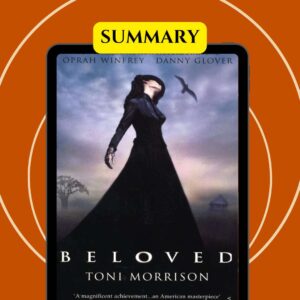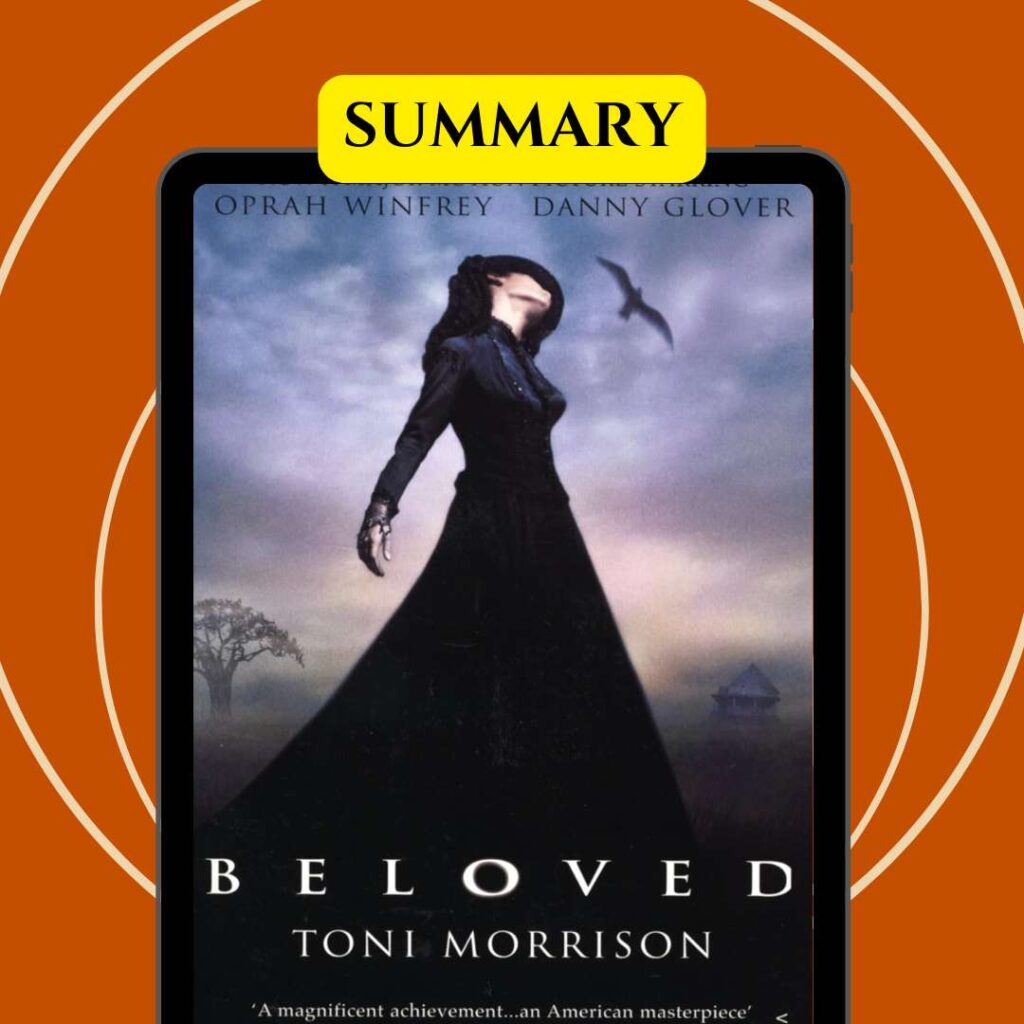Beloved Book Summary
Beloved by Toni Morrison is a powerful and haunting novel that delves into the lasting effects of slavery and the complexities of family ties.
Toni Morrison, a renowned African-American author and Nobel Laureate, is known for her profound exploration of race, identity, and history.
Beloved holds a significant place in American literature for its uncompromising portrayal of the horrors of slavery and its impact on individuals and society.
Beloved weaves together themes of trauma, memory, and identity, offering a poignant reflection on the legacy of slavery.

Table of Contents
Toni Morrison – The Author
Toni Morrison, born Chloe Ardelia Wofford, was an iconic American novelist, essayist, editor, and professor. Her works often centered on the experiences of African Americans, particularly women, uncovering deep layers of pain and resilience in the face of oppression.
Notable works by Toni Morrison
1. The Bluest Eye
2. Song of Solomon
3. Sula
4. Beloved
5. Paradise
Influence of Toni Morrison in the literary world
Toni Morrison’s literary legacy extends far beyond her impressive body of work. She was a trailblazer for African-American and female authors, earning accolades such as the Pulitzer Prize and the Nobel Prize in Literature. Her impact on the literary landscape is profound and enduring.
Detailed Character Analysis
Sethe – The Protagonist’s Journey
- Sethe, a former slave who escaped to freedom, grapples with the trauma of her past and the haunting memories that shape her present.
- Her journey showcases the enduring effects of slavery on individual identity and the complexities of motherhood alongside personal freedom.
Denver – The Impact of Isolation
- Denver, Sethe’s daughter, embodies the consequences of isolation and the struggle for connection in a world burdened by history.
- Her character reflects the deep-rooted impact of intergenerational trauma and the desire for companionship despite the shadows of the past.
Beloved – A Symbol of the Past
- Beloved, the enigmatic character embodying the spectral presence and collective memory of Sethe’s past, symbolizes the unresolved traumas of slavery.
- Her role highlights the cyclical nature of history and the ghosts that continue to haunt generations long after the physical chains have been broken.
Paul D – The Bearer of Secrets
- Paul D, Sethe’s former fellow slave and love interest, represents resilience in the face of adversity and the burden of untold truths.
- His character serves as a confidant and catalyst for revelations, navigating a path towards healing and understanding amidst the shadows of the past.
Baby Suggs – Spiritual Guidance
- Baby Suggs, Sethe’s mother-in-law and a spiritual leader in the community, embodies resilience, faith, and the strength to transcend the scars of slavery.
- Her wisdom offers a source of solace and inspiration, guiding those around her towards self-discovery and communal healing.
Schoolteacher – Representation of Oppression
- Schoolteacher, the embodiment of the dehumanizing oppressors, serves as a stark reminder of the systemic violence and power imbalances of slavery.
- His presence underscores the oppressive forces that shape the characters’ lives and the enduring legacy of racial injustice in American history.
Exploration of Major Themes
Slavery’s Psychological Scars
- Toni Morrison novels often delve into the deep psychological wounds inflicted by slavery, portraying the lasting impact on individual psyche and collective memory.
- Beloved poignantly illustrates the psychological turmoil of characters grappling with their pasts and the quest for healing amidst trauma and grief.
Maternal Love and Sacrifice
- The theme of motherhood and sacrifice resonates throughout Beloved, highlighting the profound bonds between mothers and children in the face of adversity.
- Sethe’s sacrifices and struggles as a mother underscore the complexities of love, loss, and resilience in the harsh realities of slavery’s aftermath.
Collective Memory and Trauma
- Morrison’s exploration of intergenerational trauma narratives in Beloved showcases how history and memory intersect to shape individual and communal identities.
- The characters’ shared history of enslavement and suffering underscores the power of memory in reckoning with the past and forging paths towards healing.
Search for Identity and Belonging
- The search for identity and belonging lies at the heart of Beloved, as characters navigate the complexities of self-discovery and reclaiming their histories.
- Through themes of identity, loss, and redemption, the novel reflects the deeply personal journeys of characters seeking connection, agency, and a sense of place in a world marked by displacement and trauma.
Narrative Techniques and Symbolism
Use of Non-linear Storytelling
- Morrison employs postmodern narrative techniques in Beloved, weaving a complex tapestry of past and present narrative threads to evoke the fragmented nature of memory.
- The non-linear structure enhances the story’s emotional depth and invites readers to engage with the characters’ interconnected experiences across time and space.
Symbolism of Water and Colors
- Symbolism in Morrison’s work underscores literary analysis symbolism and enriches the narrative layers in Beloved, with motifs of water and colors carrying profound meanings.
- Water symbolizes healing, cleansing, and rebirth, while colors evoke emotions, memories, and symbolic representations of themes such as life, death, and renewal.
Significance of Names and Naming
- The thematic significance of naming in Beloved underscores the power of language, identity, and reclaiming agency in a world where identities were often stripped away.
- Names carry weight and history, reflecting the characters’ journeys towards self-definition, empowerment, and the assertion of individuality amidst the legacies of oppression.
Criticisms and Controversies
Debate on the Graphic Nature of the Book
- Beloved has sparked interpretation of historical accuracy and debates about the graphic realism of its portrayal of slavery and its impacts.
- Some readers and scholars have raised concerns about the novel’s depictions of violence and trauma, questioning the boundaries of representation and storytelling in exploring painful histories.
Interpretation of Historical Accuracy
- The novel’s historical accuracy has been subject to scrutiny, with discussions on the blending of historical facts with imaginative retellings to create an emotional and evocative narrative.
- Critics and scholars continue to engage with questions of authenticity, narrative truth, and the complexities of representing historical traumas through fiction.
Gender and Race Perspectives in Critiques
- Gender and race studies have played a central role in analyzing Beloved, examining how Morrison’s representation of black womanhood challenges dominant narratives and historical silences.
- Discussions on intersectionality, embodiment, and power dynamics illuminate the novel’s critique of patriarchy, white supremacy, and the intersecting oppressions faced by African American women.
Comparative Analysis
Similarities with Other Works by Toni Morrison
- Beloved shares themes, motifs, and stylistic elements with other Toni Morrison novels, such as Song of Solomon and The Bluest Eye, reflecting the author’s consistent exploration of race, memory, and identity.
- Morrison’s oeuvre forms a cohesive tapestry of narratives that delve into the complexities of African American experiences, offering nuanced portrayals of resilience, trauma, and the quest for freedom.
Contrasts with Literature on Slavery and Freedom
- In comparison to literature on slavery and freedom, Beloved stands out for its lyrical prose, intricate characterizations, and evocative exploration of memory and legacy.
- The novel’s distinct voice and narrative structure distinguish it as a profound meditation on the enduring effects of slavery, challenging conventional narratives and pushing boundaries of storytelling.
Themes Shared with Contemporary Novels
- The themes of motherhood, trauma, and identity in Beloved resonate with contemporary novels exploring similar terrain, such as Jesmyn Ward’s Sing, Unburied, Sing and Colson Whitehead’s The Underground Railroad.
- These narratives forge connections across time and genre, showcasing the ongoing dialogue within literature on history, memory, and the human experience.
Educational and Societal Implications
Use of Beloved in Academic Curricula
- Education in literary studies often incorporates Beloved into curricula to engage students in discussions on race, memory, trauma, and the legacy of slavery.
- The novel’s academic presence underscores its enduring significance as a literary text that prompts critical inquiries into history, representation, and the complexities of human experiences.
Discussions on Race, Trauma, and Healing
- Beloved serves as a catalyst for discussions on race, trauma, and healing in academic and societal contexts, fostering conversations on identity, resilience, and historical reckonings.
- By engaging with the novel’s themes, readers confront uncomfortable truths, confront the enduring legacies of systemic injustices, and strive towards paths of understanding and collective healing.
Relevance of the Narrative in Understanding History
- The relevance of the narrative in Beloved extends beyond its literary merit to offer insights into history, memory, and the complexities of confronting difficult pasts.
- Through the novel’s lens, readers gain a deeper understanding of the human costs of slavery, the resilience of marginalized communities, and the imperative of acknowledging and learning from historical injustices.
Frequently Asked Questions (FAQs) on Beloved Book Summary:
What is the main theme of Toni Morrison’s Beloved?
The main themes of Beloved revolve around slavery’s enduring impact on identity, memory, and trauma. It delves into the complexities of motherhood, sacrifice, and the quest for self-discovery in the face of historical and personal struggles.
Who are the key characters in Beloved and what roles do they play?
The key characters in Beloved include Sethe, Denver, Beloved, Paul D, Baby Suggs, and Schoolteacher. Sethe, the protagonist, seeks to come to terms with her past, while the other characters contribute to the narrative’s exploration of family ties, oppression, and resilience.
How does Toni Morrison incorporate historical events into the storyline of Beloved?
Toni Morrison integrates historical events like slavery, post-Civil War reconstruction, and the legacy of oppression into the fabric of Beloved. These historical contexts provide depth and authenticity to the characters’ experiences and struggles.
What is the significance of symbolism in Beloved and how does it enhance the narrative?
Symbolism in Beloved, such as the use of water, colors, and names, adds layers of meaning to the story. These symbols deepen the reader’s understanding of the characters’ emotions, relationships, and the themes of memory and identity.
How has Beloved been received by critics and readers alike?
Beloved has garnered critical acclaim for its poignant portrayal of complex themes and its compelling narrative style. It has received prestigious awards and continues to be a staple in literary discussions on race, trauma, and social justice.
Recommendations and Conclusion
Who Should Read Beloved and Why
- Toni Morrison literary contributions make Beloved essential reading for those interested in exploring the nuances of African American literature, history, and the complexities of memory.
- Readers seeking profound narratives that challenge conventional storytelling, evoke emotional depth, and prompt critical self-reflection will find Beloved a compelling and enriching literary experience.
Final Thoughts on the Impact of the Book
- Beloved continues to inspire critical dialogues on race, trauma, and the enduring legacies of slavery, solidifying its place as a modern classic that transcends time and resonates with cultural consciousness.
- Morrison’s storytelling mastery and thematic richness ensure that Beloved remains a landmark work in the canon of American literature, inviting readers to engage with its profound narratives and enduring relevance.
Closing Remarks on the Enduring Legacy of Beloved
- In concluding our exploration of Beloved, we recognize the novel’s enduring legacy as a transformative work that challenges perceptions, provokes reflections, and ignites dialogues on themes central to social justice and the individual human experience.
- Through its powerful storytelling, complex character studies, and evocative representation of history and memory, Beloved continues to resonate with readers, scholars, and literary enthusiasts worldwide, cementing its place as a modern masterpiece.
Discover marketing services, interviews & publishing tools at SharingStories.



